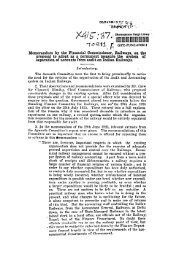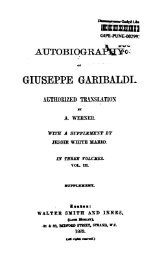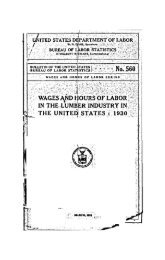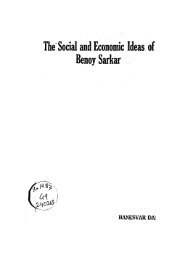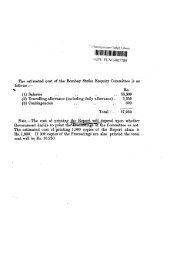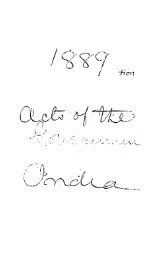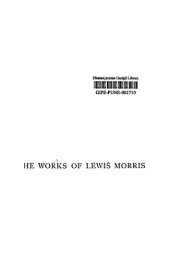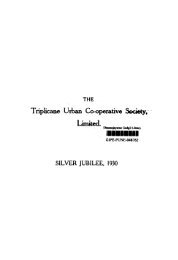Create successful ePaper yourself
Turn your PDF publications into a flip-book with our unique Google optimized e-Paper software.
320 INDIAN OPINION December I. tho 19.25<br />
not aspire to any political ambition, they, the<br />
Europeans, will see the justice and indeed the<br />
necessity of my countrymen being granted the<br />
rights I have just referred to. "<br />
, It seems to us that the intention and spirit of the<br />
Agreement was that the vested rights of the Indians<br />
should be protected and that in future the law<br />
should be sympathetically administered and also<br />
that although that agreement only settled matters<br />
existing at that time, my countrymen thought there<br />
were other matters that required consideration, but<br />
Mr. Gandhi did not think it proper to press for any<br />
more. He made it clear that although they were<br />
not pressing for them then, he thought it best to<br />
leave it until \the good sense of the European public<br />
should see fit\to grant them more elbow room, to<br />
progress.<br />
1. wish you to remember that we are South :Africans.<br />
A lot of us do not know India, except geographically.<br />
We are bred and born hllre. We hav"<br />
no other home. We speak the language, English<br />
being spoken. Some of the Indians do not know'<br />
the Iniian language. We live and think and move<br />
about exactly as the Europeans do. Weare to a<br />
large"extent South Africans and we expect that in<br />
any legislation that will be introduced that some<br />
consideration will be given as regards our faith, so<br />
that when we- have said in that statllment that it IS<br />
a breach of the -Smuts-Gandhi Agreement we do<br />
feel that all the legislation is being introduced in<br />
direct violation of vested rights and the spirit of the<br />
Agreement, which was that we should be sympathetically<br />
treated and that the other matters still<br />
to be considered would be sympathetically dealt<br />
with. Legislation is being introduCl~d -which cer-<br />
1ainly has the impression of restricting us. I think<br />
it was the view of the then Government, with Mr.<br />
Smuts at its head, that this should not be so.<br />
On the question of immigration for Indians, the<br />
Smuts-Gandhi Agreement to a very large extent<br />
said that the qUE.'stion of immigration was practically<br />
settled as at that date. Ldon't want to enter into a<br />
discuBSlon of this Bill as I attended the Conference<br />
Rnd the Conference did not wish me to enter<br />
into discussion of this Bill. I think it is right<br />
to say, however, that in this Bill you have<br />
been pleased to introduce you are restricting our<br />
personal movement, for instance, wives should be<br />
brought in within a certain period, and the increasing<br />
of the immigr-dtion bail that was required<br />
from about £30 to £100. I think this is unreasonable.<br />
There are further restrictions. Then of course<br />
there is the question of domicIle which is now defined<br />
in the Bill, which practically says that an -absence<br />
from the Oolony of three Yllars means the los9 of<br />
domicile. These are things which perhaps will<br />
appeal to you as showing that the spirit of the<br />
Agreement that we relied upon is not being carried<br />
out. Those are further restrictions, a repressive<br />
policy against the Indians, which we feel ought not<br />
to be the case. That is as much as I wish to say at<br />
present.<br />
DR. MALAN: I think before we go furthQr it is<br />
just as well that we come to some clear idea as to<br />
what was in the Smuts-Gandhi Agreement and<br />
what was not. As you will know the Alliatic Enquiry<br />
Commission was appointed in 1921, or rather<br />
the Report was published in 1921. That Commission<br />
went very exhaustively into the whole question<br />
of what the -so-oallell Smuts-Gandhi Agreement<br />
really contained and what not. Now on page Iii of<br />
the Report. In the first place you will see there<br />
that that so-called Smuts-Gandhi Agreement which<br />
was to put an end to all these differences between<br />
tile Government and the Indian population, was<br />
/based on the definite understanding that after that<br />
(agreement there should be no further agitation on<br />
J -he part of the Indian population in regard to the<br />
laws of t4e (.ount)'y. Now, as you will see from ~Ir.<br />
./<br />
Gandi's letter, Mr. Gandhi did not acoept that. It<br />
was definitely understood that there was to be an<br />
end to the agitation against Ilegislation.<br />
[The Minister then read over again the whole<br />
passage qrwted above by Mr. Godfrey from ]\1r.<br />
Gandhi's letter.]<br />
The second point is this-that the nndertakIng of<br />
General Smuts at that hme rel-ltl:'d ouly to the<br />
administration of the existing laws. As r.11" as I can<br />
see no undertaking was given or could have been<br />
given by any Government that the laws would not<br />
be changed or that any laws with regard to any<br />
question would not in future be introduced. Couditions<br />
are continually changing in every country<br />
and it is an impossibility for any Government to gi ve<br />
an undertaking that no additional laws will be made<br />
in respect of a certain subject or that existing laws<br />
will not be changed. General Smuts said .-<br />
" With regard to the administratiou of eXlsting<br />
laws, the Minister desires me to say that it<br />
always has been and will continue to be the<br />
desire of the Government to see that they are<br />
administered in a just manner anfl with dne<br />
~egard to vested rights."<br />
Now we come to the point of vested rights.<br />
Vested rights, General Smuts said, would alw,\ys be<br />
protected. Now I find in tho report of the Asiatic<br />
Enquiry Commission that Mr. Gandhi took the<br />
precaution before leaving South AfriCiL to put on<br />
paper what he thought WelS included in that pl·omise,<br />
what vested rights really meant. Now I think this<br />
is very different from what h" says here :-<br />
"DEAR MR. GORGES,-I have now got a<br />
moment to submit my note 011 the Gold Law.<br />
As you know, after mature consideration, I<br />
refrained from pressing for the insertion of a<br />
special clause defining "vested rights" in connection<br />
with the Gold La.w and Townships<br />
Amendment Act, because I felt that any defimtion<br />
in the correspondence might result in<br />
restricting the futnre action of my countrymen.<br />
However, so far as my interpretttion of • vested<br />
rights' is concemed, I thiuk I should reduce<br />
it to writing. GenE.'ral Smuts was good enough<br />
to say that he would enrleavour to protect vested<br />
rights as defined by me. The fol\owing is the<br />
definition I submitted to SIr Benjamin Robertson,<br />
who, I understood, submitted it to General<br />
Smuts. My letter to Sir Belljamin Robertson<br />
containmg among other matters the definition,<br />
is dated the 4th March 1914: • By vested rights<br />
I understand the right of an Indian and his<br />
successors to live and trade in the township in<br />
which he was living and tradmg, no matter how<br />
often he shifts his residence or business from<br />
place to place in the Slme township. I am<br />
fortIfied in my interpretdtion by the answer<br />
glVen by :Mr. Harcourt III connection with the<br />
matter, in the Honse of Commons, on the 27th<br />
June 1911:-<br />
, Complaints against that legislation (the Gold<br />
Law and Townships Amendment Act) have<br />
been made and are now being investig-



